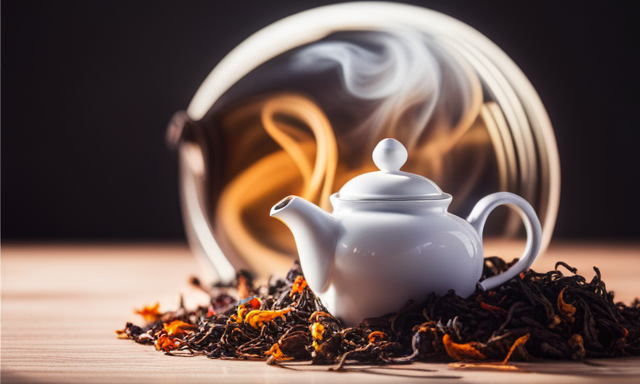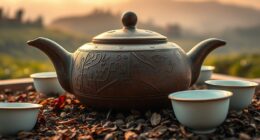Imagine you are strolling through a fragrant garden, the air filled with the delicate scents of blooming flowers and fresh herbs. As you admire the vibrant colors and lush foliage, you can’t help but wonder: which of these herbal teas are safe for me to enjoy during my pregnancy?
Pregnancy is a time of excitement and anticipation, but it can also bring about a myriad of questions and concerns. One area that often raises eyebrows is the consumption of herbal teas. While some herbal teas can offer a range of benefits for expectant mothers, others may pose potential risks.
In this article, we will explore the world of herbal teas and pregnancy, delving into the benefits of certain varieties, as well as the ones to avoid. We will also provide you with a comprehensive list of safe and beneficial herbal teas for pregnancy.
Additionally, we’ll share tips on how to prepare and brew herbal tea safely, and the importance of consulting with your healthcare provider.
So, grab your favorite mug, and let’s embark on this journey of herbal teas and pregnancy together!
Key Takeaways
- Chamomile tea and peppermint tea should be avoided during pregnancy as they may increase the risk of preterm labor and complications.
- Raspberry leaf tea should be avoided during the first trimester as it may cause uterine contractions.
- Ginger tea can alleviate nausea and indigestion during pregnancy.
- Rooibos tea is a safe option during pregnancy and can provide benefits such as promoting digestion, boosting the immune system, and providing relief from allergies and skin conditions.
Benefits of Herbal Tea During Pregnancy
Did you know that drinking herbal tea during pregnancy can have numerous benefits for both you and your baby?
Many herbal teas are packed with essential nutrients and antioxidants that can support a healthy pregnancy. For example, chamomile tea can help relieve pregnancy-related insomnia and anxiety, while ginger tea can alleviate morning sickness and aid digestion.
Additionally, herbal teas like red raspberry leaf tea can strengthen the uterus and potentially ease labor. However, it’s important to note that not all herbal teas are safe to consume during pregnancy. Some herbs may stimulate contractions or have other adverse effects on pregnancy.
Therefore, it’s crucial to consult with your doctor before adding herbal tea to your daily routine.
Now let’s explore the herbal teas to avoid during pregnancy and ensure a safe and healthy journey for you and your little one.
Herbal Teas to Avoid During Pregnancy
Are there any specific types of herbal teas that should be avoided during pregnancy? Absolutely. While herbal teas can be beneficial during pregnancy, there are certain varieties that should be avoided due to potential risks. Here are three herbal teas that are best to steer clear of during pregnancy:
-
Chamomile tea: Although chamomile tea is known for its calming properties, it’s not recommended during pregnancy as it may increase the risk of preterm labor.
-
Peppermint tea: While peppermint tea can help with digestion and nausea, it can also relax the muscles of the uterus, potentially leading to complications.
-
Raspberry leaf tea: Although raspberry leaf tea is often recommended for its benefits during labor, it’s best to avoid it during the first trimester as it may cause uterine contractions.
It’s important to consult with your healthcare provider before incorporating any herbal teas into your pregnancy routine. Now, let’s explore the safe and beneficial herbal teas for pregnancy.
Safe and Beneficial Herbal Teas for Pregnancy
During pregnancy, it’s important to be cautious about the herbal teas you consume, but there are some options that are safe and even beneficial.
Ginger tea is known for its ability to alleviate nausea and morning sickness, making it a popular choice for pregnant women.
Peppermint tea can help relieve digestive issues and provide a refreshing taste.
Rooibos tea is packed with antioxidants and has a soothing effect.
Ginger Tea
If you’re looking for a soothing and safe herbal tea option during pregnancy, ginger tea is a must-try! Ginger has been used for centuries to alleviate nausea and indigestion, which are common discomforts during pregnancy. It is generally considered safe to consume ginger tea in moderation during pregnancy, as long as you stick to a safe dosage. The recommended dosage is no more than 1 gram of ginger per day. However, it’s always best to consult with your healthcare provider before adding any new herbal teas to your routine.
While ginger tea is generally well-tolerated, some women may experience mild side effects such as heartburn or diarrhea.
If you’re interested in exploring other herbal tea options, let’s move on to peppermint tea and its benefits for pregnant women.
Peppermint Tea
Peppermint tea is a refreshing and invigorating option that can provide relief from common discomforts of pregnancy. It has been used for centuries to soothe digestive issues, such as nausea and indigestion, which are common during pregnancy. Peppermint tea is known for its calming properties and can help alleviate stress and anxiety. Additionally, it has a cooling effect that can provide relief from hot flashes and night sweats that may occur during pregnancy. However, it is important to consume peppermint tea in moderation, as excessive intake may lead to heartburn or acid reflux. It is always best to consult with your healthcare provider before incorporating any herbal tea into your pregnancy routine. Moving on to the next topic, let’s explore the benefits and potential side effects of rooibos tea.
Rooibos Tea
Indulge in the soothing and flavorful experience of sipping on a cup of rooibos tea, as it offers a range of health benefits while being a delightful addition to your daily routine.
Rooibos tea, also known as red bush tea, is a caffeine-free herbal tea made from the leaves of the Aspalathus linearis plant, native to South Africa. It’s rich in antioxidants, such as aspalathin and nothofagin, which may help protect against oxidative stress and inflammation in the body.
Rooibos tea benefits include promoting digestion, boosting the immune system, and providing relief from allergies and skin conditions. If you’re not a fan of the taste, fear not! There are also alternative flavors available, such as rooibos with vanilla or fruit infusions.
Now that you know about the benefits of rooibos tea, let’s move on to preparing and brewing herbal tea safely, ensuring you make the most of your pregnancy journey.
Preparing and Brewing Herbal Tea Safely
When preparing and brewing herbal tea safely, it’s important to choose organic and natural ingredients to ensure the highest quality and purity. This helps to avoid potential exposure to pesticides and other harmful chemicals.
Additionally, it’s crucial to steep the tea for the proper amount of time and at the correct temperature to extract the desired flavors and therapeutic properties without compromising safety.
Lastly, one should always be cautious of contaminants and additives, such as artificial flavors or sweeteners, which can negate the potential health benefits of herbal tea.
Choosing Organic and Natural Ingredients
If you’re looking for a safe and healthy option during pregnancy, go for organic herbal teas made with natural ingredients to nourish your body and soul. Organic tea offers numerous benefits, as it’s grown without the use of synthetic pesticides or fertilizers, ensuring that you’re consuming a pure and toxin-free beverage. Here are a few reasons why choosing organic and natural ingredients is essential for a healthy pregnancy:
- Organic teas are free from harmful chemicals that can potentially harm the developing fetus.
- Natural remedies such as chamomile, ginger, and peppermint can help alleviate common pregnancy discomforts like nausea and indigestion.
- Organic herbal teas are rich in antioxidants and other beneficial compounds, which can support your immune system and overall well-being.
- Choosing organic supports sustainable farming practices, protecting the environment for future generations.
- Organic teas often have a more robust and authentic flavor, enhancing your tea-drinking experience.
Now that you know the importance of choosing organic and natural ingredients, let’s move on to the next step: the proper steeping time and temperature.
Proper Steeping Time and Temperature
Make sure to steep your organic and natural ingredients at the proper time and temperature to achieve the perfect cup of tea that’ll leave you feeling refreshed and satisfied. Proper steeping techniques are essential for maximizing the benefits of herbal teas for relaxation during pregnancy.
Each herbal tea has its own recommended steeping time and temperature to release its medicinal properties effectively. For example, chamomile tea should be steeped for about 5 minutes at a temperature of 200°F to ensure the release of its calming properties. On the other hand, peppermint tea should be steeped for 3-5 minutes at a temperature of 212°F to extract its soothing effects.
By following these guidelines, you can enjoy the full potential of your herbal tea. Transitioning into the subsequent section about avoiding contaminants and additives, it’s also important to be mindful of the water quality and the source of your herbal ingredients.
Avoiding Contaminants and Additives
To truly embrace the purity of your brew, be cautious of any contaminants or additives that may compromise the quality of your soothing sip. When it comes to herbal tea, it’s important to avoid pesticides and understand herbal tea labeling. Many herbal teas are grown with the use of pesticides, which can be harmful to both you and your baby. Look for organic teas that are certified free of pesticides to ensure you’re making a safe choice. Additionally, read the labels carefully to avoid teas that contain additives or artificial flavors. To help you navigate the world of herbal tea, here’s a helpful table:
| Contaminants to Avoid | Additives to Avoid |
|---|---|
| Pesticides | Artificial flavors |
By being mindful of what you’re consuming, you can enjoy your herbal tea with peace of mind. Now, let’s move on to the next topic of consulting with your healthcare provider.
Consulting with Your Healthcare Provider
Before incorporating herbal tea into your pregnancy routine, it’s crucial to consult with your healthcare provider. They can provide personalized advice based on your individual health status and address any concerns or medical conditions you may have.
By discussing herbal tea consumption with your doctor, you can make informed decisions that prioritize the safety and wellbeing of both you and your baby.
Discussing Herbal Tea Consumption with Your Doctor
When talking to your doctor about herbal tea consumption during pregnancy, imagine yourself sitting in their cozy office. Discuss the different varieties of herbal tea that may be safe for you to enjoy. It’s important to discuss the risks and benefits of herbal tea with your healthcare provider. They can provide guidance based on your specific medical history and needs.
Some alternative remedies to consider include chamomile tea, which may help with relaxation and sleep. Ginger tea can alleviate nausea. Peppermint tea may help with digestion. Raspberry leaf tea is believed to strengthen the uterus. These options can provide a soothing and comforting experience during pregnancy.
Address any concerns or medical conditions with your doctor. This will ensure that you make informed decisions about herbal tea consumption while pregnant.
Addressing Any Concerns or Medical Conditions
During your discussion with your doctor, it is important to address any concerns or medical conditions that may affect your choices regarding herbal tea consumption during pregnancy. Your doctor can provide guidance based on your specific situation and help you make informed decisions. It is also essential to consider any dietary restrictions you may have and how they may impact your herbal tea choices. Additionally, discussing any pregnancy symptoms you are experiencing can help your doctor recommend herbal teas that may help manage these symptoms. To further assist you, here is a table outlining some common concerns or medical conditions and the corresponding herbal teas that are generally considered safe during pregnancy:
| Concern/Medical Condition | Recommended Herbal Tea |
|---|---|
| Nausea and morning sickness | Ginger tea |
| Insomnia | Chamomile tea |
| Digestive issues | Peppermint tea |
| Anxiety or stress | Lemon balm tea |
By addressing these concerns and conditions, you can ensure that you are making choices that are best for you and your baby. Moving forward, let’s explore some other tips for a healthy pregnancy.
Other Tips for a Healthy Pregnancy
Furthermore, incorporating additional strategies for maintaining a healthy pregnancy is essential.
Along with drinking herbal tea, there are other important aspects to consider. Firstly, maintaining a healthy diet during pregnancy is crucial. Consuming a variety of fruits, vegetables, whole grains, and lean proteins can provide the necessary nutrients for both the mother and the baby.
Additionally, regular exercise is beneficial for a healthy pregnancy. Engaging in low-impact activities such as walking, swimming, or prenatal yoga can help improve circulation, reduce pregnancy discomfort, and enhance overall well-being. It’s important to consult with a healthcare provider before starting any exercise routine.
By following these tips for a healthy diet and incorporating safe exercises, pregnant women can promote their well-being and support the development of their baby.
In conclusion, taking a holistic approach to pregnancy health is key.
Conclusion and Final Thoughts
In conclusion, maintaining a healthy lifestyle during pregnancy is crucial for the well-being of both the mother and the baby. By following the tips mentioned earlier, such as eating a balanced diet, staying active, and getting regular prenatal check-ups, you’re taking important steps towards a healthy pregnancy.
Additionally, it’s important to remember that not all herbal teas are safe to consume during pregnancy. To ensure the safety of both you and your baby, it’s advisable to consult with your healthcare provider before incorporating any herbal teas into your daily routine. They can provide you with personalized recommendations based on your specific needs and medical history. While certain herbal teas, such as chamomile and ginger, are generally considered safe, it’s always best to err on the side of caution and seek professional advice.
Prioritize your health and the health of your baby by making informed choices and following your healthcare provider’s recommendations throughout your pregnancy journey.
Frequently Asked Questions
Can I drink chamomile tea during pregnancy?
Yes, you can drink chamomile tea during pregnancy. It has numerous benefits, such as reducing anxiety and improving sleep. However, if you prefer alternatives, you can try peppermint, ginger, or raspberry leaf tea.
How much herbal tea is safe to consume during pregnancy?
During pregnancy, it is safe to consume moderate amounts of herbal tea. Herbal teas offer various benefits, such as aiding digestion, reducing nausea, and promoting relaxation. Recommended options include ginger tea, peppermint tea, and raspberry leaf tea.
Can I drink green tea while pregnant?
Yes, you can drink green tea while pregnant. It is a great alternative to caffeinated beverages and provides numerous benefits for pregnant women, such as antioxidants and hydration.
What are the potential risks of drinking herbal tea during pregnancy?
Drinking herbal tea during pregnancy may pose potential risks to fetal development. Some herbal teas contain herbs that can stimulate the uterus or have chemicals that could be harmful to the baby. It is essential to consult with a healthcare professional before consuming herbal tea while pregnant.
Are there any specific herbal teas that can help with common pregnancy symptoms like morning sickness or insomnia?
Oh, the wonders of herbal tea! When it comes to pregnancy symptoms like morning sickness or insomnia, there are some natural remedies worth exploring. Ginger tea for nausea and chamomile tea for sleep might just do the trick!
Conclusion
In conclusion, choosing the right herbal tea during pregnancy can provide numerous benefits for both the mother and the baby. However, it’s crucial to be aware of the herbal teas to avoid, as they may have adverse effects. It’s always wise to consult with your healthcare provider before incorporating any herbal tea into your pregnancy routine.
By following the guidelines for safe preparation and brewing, you can enjoy the soothing and beneficial properties of herbal tea while ensuring a healthy pregnancy. So, sip your way to a happy and healthy pregnancy with the right herbal tea choices!










